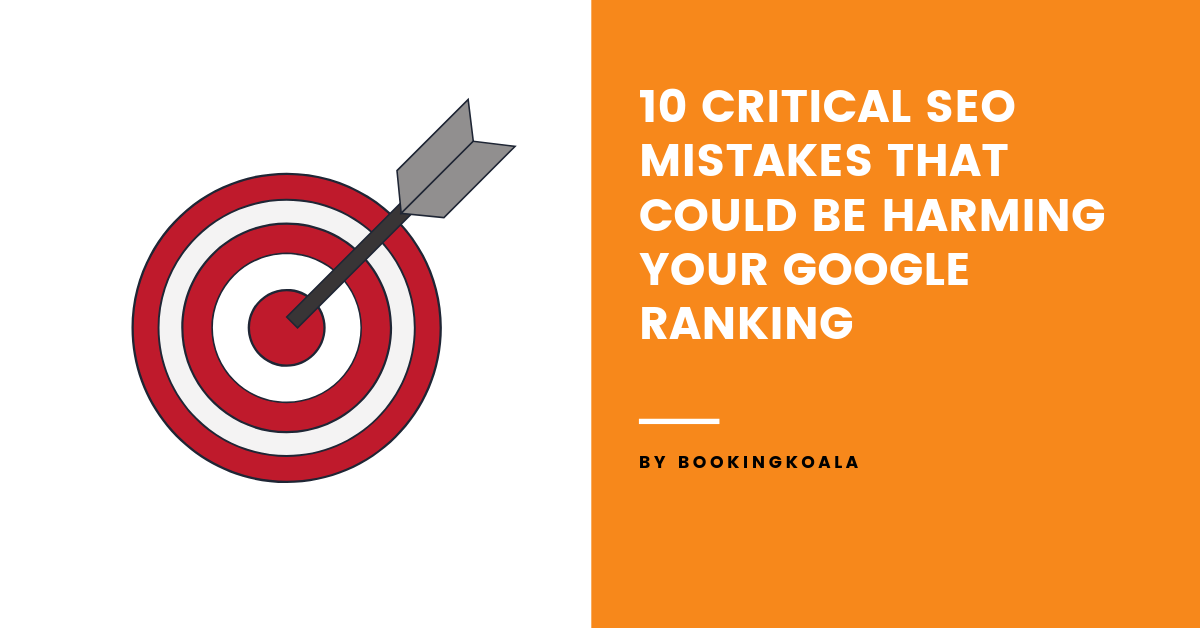The Google algorithm has approximately 200 ranking factors determining where each page ranks. Trying to understand what each factor is and the importance it plays is a thankless task. For most site owners, it makes more sense to focus on crafting the best content based on relevant search queries. You can, however, easily make some simple mistakes that severely damage your chances of ranking. Understanding the following errors can ensure you focus only on the factors that provide Google and searchers with exactly what they are looking for.
Low-Quality Content

Google has become far better at recognizing quality content that provides a great user experience. You may be able to rank for a short time with brief articles that provide no value. Over time, though, you should find this issue is corrected. Aim to provide content that is superior to the current ranking sites, focusing on relevance to the main search query.
Lack of Mobile Optimization
If your site is not mobile friendly, you are going to struggle to gain search traffic. Google now uses mobile-first indexing, aimed at catering to their primary mobile users. The importance of mobile can also be found in site speed, with slow loading pages being particularly problematic for mobile users. You can use the PageSpeed Insights and Mobile-Friendly Test tools to monitor these factors.
Duplicate Content
Duplicate content could potentially cause issues, so it is best to resolve it before it becomes a problem. Duplicate content can occur when you have pages on your website listing the same article, when you have duplicated large parts of your own articles, and when you accept guest posts that are not unique. There are many duplicate content checker tools that can find issues, allowing you to block certain pages from Google or alter the content significantly.
High Bounce Rate
A high bounce rate occurs when visitors quickly click back after visiting your page. When this issue consistently happens, Google will recognize that your page is not providing a relevant and satisfactory result for searchers. If you are experiencing a high bounce rate, focus on why your page is not meeting the needs of most visitors from a particular keyword.
Lack of Return Visits
Along with bounce rate, Google wants to see visitors return to your site. A single visit could suggest that visitors did not have a good user experience, so they did not want to return. The weight of this problem can vary based on the keyword, though, as there are certain search terms that only require basic information.
Excessive Keyword Usage

The importance of keywords has lessened over the years. Google can work out the topic of a page based on surrounding content and backlinks, so you don’t need to artificially use keywords where they don’t naturally belong. Focus on content that is natural, using your main keywords sparingly in the title and within the body copy.
Bad Links
Link building remains a key part of SEO, but you need to be considerate of your linking profile. A large number of poor-quality links compared to your overall profile will be potentially damaging. Similarly, paid links can be damaging if the network is discovered. Ideally, you will have a broad range of links, anchor text, and topical relevance.
No Outbound Linking
Outbound linking helps Google to understand the niche you are operating in and shows signs of trust. The topical relevance of a piece of content will be learned through analysis of the language, but also by the interlinking between different sites around the web. The trust factor is gained as sites are shown to be willing to direct traffic to an external source if it is most appropriate to provide a great user experience.
Poor User Reviews
Poor reviews signal that the user experience was poor. This will, of course, have a negative impact on consumers seeking out information. It will also, though, lead to a low click-through rate as searchers weight up whether to visit your page. Google doesn’t want to send people towards sites that will offer them low-quality or irrelevant content, so cultivating positive responses is important.
Inconsistent NAP Information
Local businesses can suffer when they don’t use a consistent name, address, and phone number (NAP) information across their citations. Directories typically use data aggregators for their listings, and slight alterations in NAP info can lead to negative SEO results. Updating these details is not hard, but it can often go unnoticed when you don’t run audits.
SEO can be frustrating when you can’t reach the first page of Google for your main keywords. You could be promoting your content effectively, but still find that inferior pages are ranking above you. While it is difficult to pinpoint exactly why a page is ranking, Google does want to provide the most relevant and quality pages to its users. Fixing these errors won’t guarantee a ranking improvement, and you can always find ways to promote yourself better. You will, however, provide your visitors with an excellent user experience and stand a great chance of ranking.
